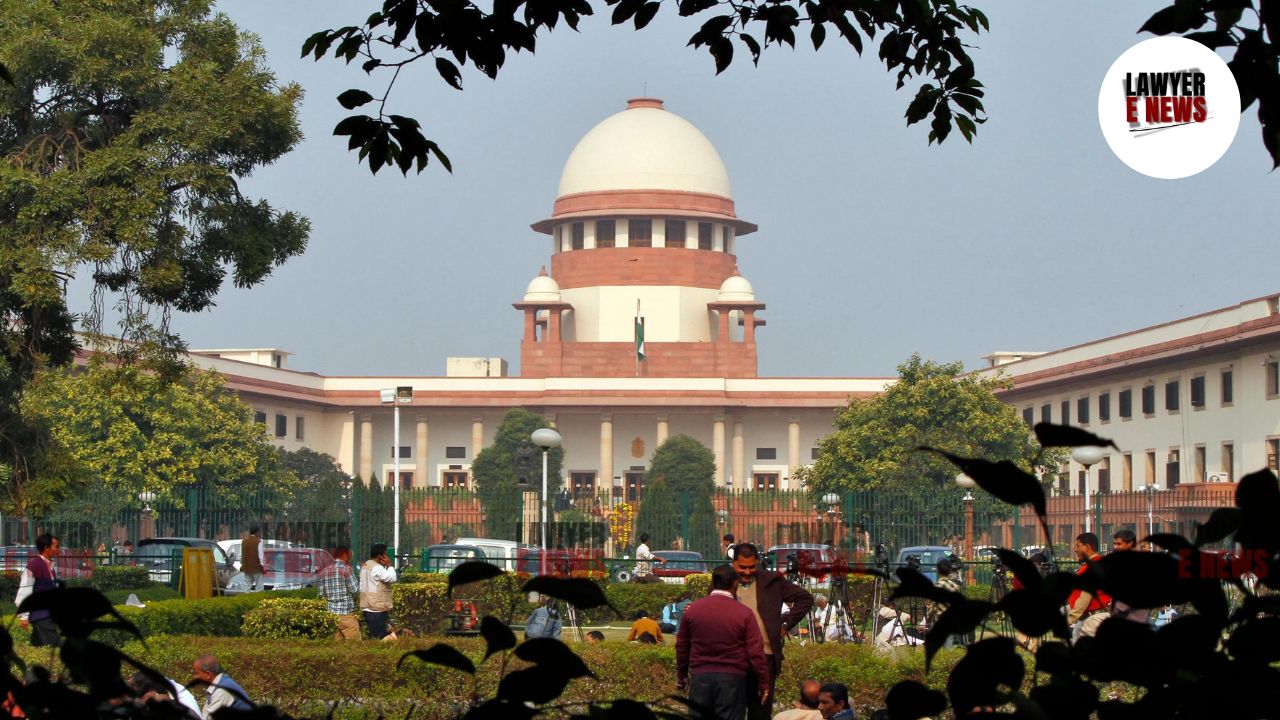-
by Admin
15 February 2026 2:36 AM



Supreme Court of India addressing the quantum of compensation awarded under Section 166 of the Motor Vehicles Act, 1988, for the tragic death of three family members in a motor accident. The Court dismissed appeals by both the insurer (seeking a reduction) and the claimant (seeking further enhancement), holding that the High Court's enhanced compensation was "just, reasonable, and aligned with the principles of law."
The ruling reiterates the importance of balancing established legal principles, including deductions for personal expenses, future prospects, and adherence to conventional head guidelines, with the need to deliver "just compensation" under the Motor Vehicles Act.
The case arose from a motor vehicle accident on June 20, 2007, in which the claimant, Ms. Sonigra Juhi Uttamchand, lost her father, mother, and younger brother. The accident was caused by a rashly driven Tata van (insured by New India Assurance Co. Ltd.), which collided with the auto-rickshaw in which the deceased were traveling.
The claimant sought compensation for the death of her family members by filing three separate petitions before the Motor Accidents Claims Tribunal (MACT). The Tribunal found the van’s driver negligent and directed the insurer to indemnify the vehicle owner. It awarded compensation as follows:
Father: ₹14,78,000/-
Mother: ₹13,33,936/-
Brother: ₹2,45,000/-
On appeal, the Madras High Court enhanced the compensation:
Father: ₹30,58,000/-
Mother: ₹16,34,000/-
Brother: ₹5,00,000/-
The insurer challenged the High Court’s enhancements for the father and mother, citing errors in deductions for personal expenses and conventional heads. The claimant filed separate appeals, seeking further enhancement for all three.
Deduction for Personal Expenses: Sarla Verma Principles
The insurer argued that the High Court erred in failing to deduct one-third of the deceased parents' income for personal expenses, as mandated by Sarla Verma v. Delhi Transport Corporation (2009).
The Supreme Court observed:
"While calculating the quantum of compensation for death, deduction is bound to be effected towards personal and living expenses."
The Court acknowledged the error by the High Court in not deducting one-third of the income but declined to interfere, reasoning that the overall compensation awarded was reasonable and aligned with the principle of "just compensation."
Future Prospects for Self-Employed Deceased Persons
The claimant sought the inclusion of future prospects in the income calculation for her deceased parents, both of whom were self-employed and ran a jewelry shop.
The Court noted that:
"In the case of self-employed individuals, future prospects must be added to the income calculation."
Citing Pranay Sethi v. National Insurance Co. Ltd. (2017), the Court held that 25% should be added for the father (aged 48) and 40% for the mother (aged 38). However, it found that the High Court's overall enhancement was sufficient and required no further adjustment.
Conventional Heads: Compliance with Pranay Sethi Guidelines
The insurer argued that the amounts awarded under "conventional heads" (loss of estate, loss of consortium, and funeral expenses) exceeded the ₹70,000 cap set in Pranay Sethi.
The Court acknowledged the excess but declined to reduce the compensation, noting that:
"The awards by the Tribunal and High Court were made before Pranay Sethi was decided. Further, the amounts granted are not exorbitant and align with the principle of 'just compensation.'"
Reassessment of Quantum
The Court reassessed the quantum of compensation, considering all applicable deductions and enhancements, and concluded that the High Court’s figures were not excessive. It noted:
"Any recalculation would marginally lower the compensation, but such minor adjustments would be inequitable, given the appellant’s unique plight and the overarching goal of delivering justice."
The Court emphasized the claimant’s tragic circumstances, including the loss of three close family members at a young age and the emotional and financial burdens she endured.
The Supreme Court dismissed all appeals, affirming the High Court’s enhanced compensation:
Father: ₹30,58,000/-
Mother: ₹16,34,000/-
Brother: ₹5,00,000/-
The Court reasoned that while technical errors existed in the High Court’s calculations, the overall award was just, reasonable, and aligned with the spirit of the Motor Vehicles Act, which mandates "just compensation."
Key Takeaways:
Deduction for Personal Expenses: The Court reinforced the principle of deducting personal expenses but declined to interfere where the overall compensation remained reasonable.
Future Prospects: Future prospects are applicable to self-employed individuals, but the Court emphasized a pragmatic approach to quantum assessment.
Conventional Heads: Awards exceeding Pranay Sethi guidelines may be sustained if reasonable and aligned with justice.
Overarching Principle: The Court highlighted that "just compensation" must factor in the unique circumstances of each case, beyond mere technical compliance with legal formulas.
The Supreme Court’s judgment in New India Assurance Co. Ltd. v. Sonigra Juhi Uttamchand underscores the judiciary's commitment to delivering justice in motor accident cases by balancing established legal principles with the humane realities of claimants’ suffering.
Date of Decision: January 2, 2025
